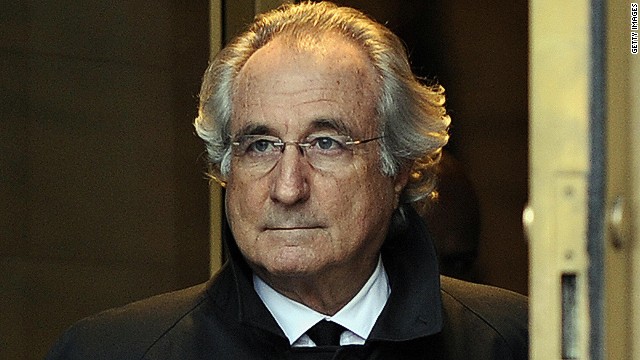The $17 Billion Fraud
Almost everybody has heard of Bernie Madoff, the infamous fraudulent "investor" who ran an elaborate Ponzi scheme. You probably have, too; his name was on the lips of a lot of people around 2008-2010, and his scheme was reported often in the news.
Madoff's fraudulent investment scheme was supposed to have been worth $65 billion, which makes this the largest fraudulent scheme ever perpetrated by an individual! In reality, however, people actually put roughly $17.5 billion of their own money into the scheme; the other $47.5 billion refers to profits that never actually existed and therefore cannot be recovered. [The taxes people paid on these fictitious profits are, of course, not recoverable either.]
Attorney Irving Picard is trying to recoup the $17 billion that investors put in. ABC News reports that, as of February 2016, he recovered just over $11 billion for investors who lost money. However, that process is inevitably difficult, as Yale accounting professor Dr. Rick Antle explains.
But do you really know what Madoff did?
If you want to find out how Madoff's scheme even outdid Ponzi himself, the Wikipedia article preserved here (via the Internet Archive's Wayback Machine) explains what he did, in terms that are surprisingly interesting, considering the technical nature of the crimes.
How can you protect yourself from sophisticated crimes like this?
- Don't believe any claim that sounds "too good to be true." If somebody is promising you unusually high returns (as most Ponzi schemes do) or exceptional stability in an investment (as Madoff did), it's almost certainly a con.
- In a similar vein, if somebody preaches a six-figure sales-based job 'opportunity' with minimal training and effort, that's also a common marker of fraud or deceit. Often, you'll have to pay for training (but hey! Based on recruiters' promises, you're going to make that amount back in the first two weeks!). But then don't tell you until later that the entire compensation is commission-based, or that you'll have to pay for continuous training plus products or equipment.
In January 2018, a big story about the well-known insurance firm Aflac revealed that they engage in many of these practices. While it will be a while before all the relevant facts are known, this just goes to show that even well-known companies are not immune from this questionable behavior.
- Ask tough questions, like "where is the profit coming from?" If you can't tell, or if the answer is too complicated for you to understand, don't get involved. It may be fraudulent, or it may be legitimate. If you can't tell, don't put your money into it. Better safe than sorry, as the saying goes.
In some cases, it may actually be relatively simple to understand, such as Charles Ponzi's famous scheme. But to sustain the volume of money that Ponzi was dealing with, he would have had to trade in over 150 million Italian "international reply coupons"—but only about 27,000 such coupons actually existed worldwide!
Ask questions. Demand answers. Double-check those answers yourself.
- Diversify, diversify, diversify! If you put all your eggs in one basket, and the money manager "drops the basket," so to speak, by either by having a poor long-term strategy or by engaging in fraud, you're subject to lose all of your money!
Fortunately, technology and innovations like mutual funds (particularly index funds) have rendered it pretty easy to diversify at low cost, as I explain here. Many fiduciary investment professionals recommend something along the lines of an 80% stock, 20% bond mix. Check out this smart breakdown of how different strategies have performed in the past.
It is relatively easy to follow this advice by putting the bulk of your money into a low-cost total stock market index fund like Vanguard's VTSAX, and the remainder into a bond fund like Vanguard's VBTLX.
Why Vanguard? In short, it's client-owned, so they have every incentive to charge the lowest rates possible and to avoid incurring unnecessary expense. Jim Collins, of the jlcollinsnh blog, explains the structure clearly and succinctly here.
Don't believe some random bloggers like me or Jim Collins? That's reasonable, so I'll provide more sources:
-Investopedia says the same thing about Vanguard's ownership, and it also advocates index investing (as do I).
-MarketWatch calls Vanguard a "role model."
-Barron's touts the benefits of Vanguard's setup.
-Vanguard themselves describe their ownership structure here.
-Forums on Reddit and MrMoneyMustache give the same assessment.
- If you're involved in business operations, you should know that there's an Association of Certified Fraud Examiners. Businesses and other organizations who hire accountants with this certification may detect fraudulent practices more quickly than those who don't hire ACFE-certified accountants.
Defend yourself by educating yourself.
Sharing a Froogal Stoodent article has never been more caring!
Tell a friend not to get suckered!
***
Want an easy way to support the Froogal Stoodent blog? Check out these recommended laptops or this list of headphones; anything you buy will generate a small commission—at no cost to you! Thanks!





No comments:
Post a Comment